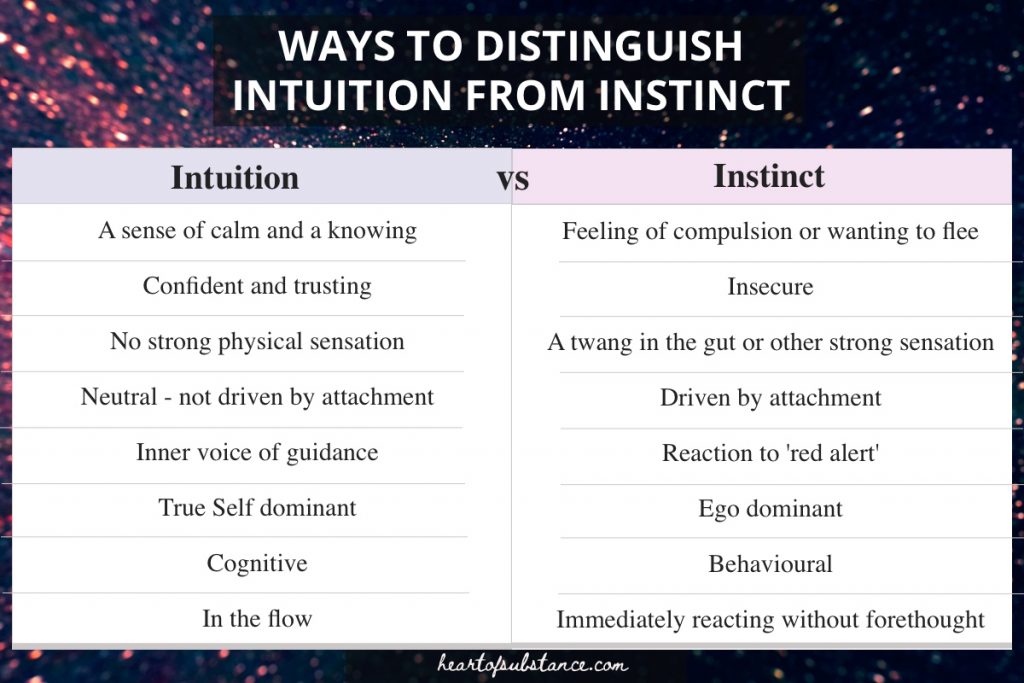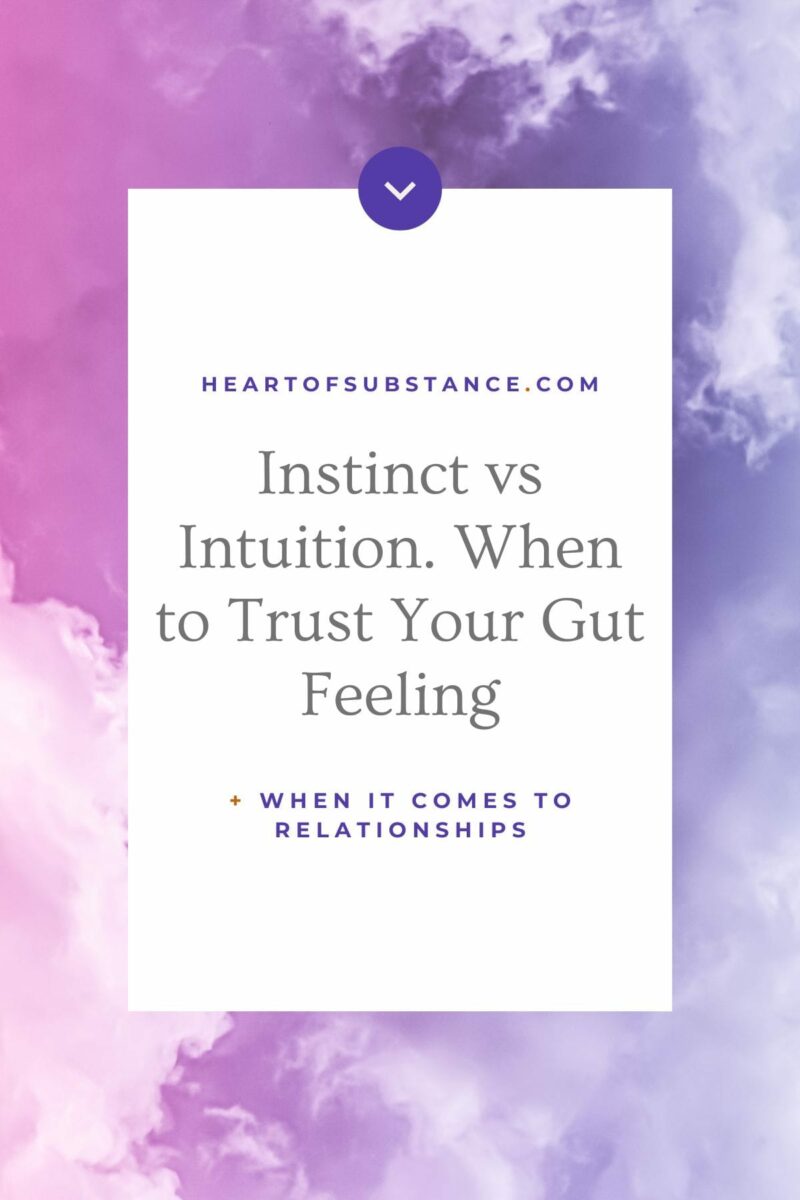Is instinct the same as intuition? There are certain differences to spot between instinct and intuition and whether you can ‘trust your gut’. In this article, I look at these differences, including when it comes to relationships.
How to distinguish instinct from intuition
Key Takeaway: Several points of difference can help you distinguish what you’re feeling or sensing as either intuition or instinct, here are 8 to consider:
You might hear “follow your heart” versus your head which is about intuition versus rational thinking rather than instinct. The following define the meaning of instinct and intuition for this article.
Instinct Meaning
Instinct is the natural tendency that a person or animal has to behave or react in a particular way – (Collins Dictionary).
Think of ‘your instincts’ meaning this: I didn’t have as strong a maternal instinct as some other mothers – (Collins Dictionary)
This is the instinct vs intuition definition I maintain in this article.
Intuition Meaning
Intuition definition: Unexplained feelings you have that something is true even when you have no evidence or proof (Collins Dictionary).
Think of it this way: Her intuition was telling her that something was wrong. (Collins Dictionary).
Also, from a psychological viewpoint: Intuition is a form of knowledge that appears in consciousness without obvious deliberation (intuition definition, Psychology Today).
Your intuition is your subliminal processing of information that goes beyond rational thought.
It is valuable for deciding and judging what’s best in today’s world of rapid change and complexity.¹
What does intuitive mean? Being intuitive means that you more often know or sense without conscious reasoning what is right or true.
“An intuitive statement is one that you know is true even before you know why or how it is true.” ~ N.D. Walsch.
Intuition vs instinct key differences…

Is Intuition Real? Where Does Intuition Come From?
According to Albert Einstein: “The only real valuable thing is intuition.”
Science is not clear on where intuition comes from, but it’s considered a way our brains gather and store information and then tap into that stored data to provide flashes of pertinent knowledge.
The above answer is abstract – but it has to do with your brain recognizing patterns.
In terms of intuition vs instinct as an experience, what intuition feels like is a ‘just knowing’ out of the blue. Whereas instinct is a physical reaction to a trigger (stimuli).
In Blink: The Power of Thinking Without Thinking, Gladwell refers to the origins of this ‘just knowing’ (or intuition) as the adaptive unconscious and likens it to our internal computer.
Author Malcolm Gladwell believes that “The power of knowing, in that first two seconds, is not a gift given magically to a fortunate few. It is an ability that we can all cultivate for ourselves.” It is one of nature’s gifts.
Should You Trust Your Intuition?
Studies show intuition leads us to better choices ¹ ² ³ and that professionals succeed by trusting their intuition.¹
See also: Women’s Intuition And the Woman Instinct Never Fails Idea
But, do you look to the heavens? And, what about trusting your intuition in a relationship setting off red flags?
Should you trust your instincts in relationships. But more than that…Should you trust your intuition in everyday decisions?
I share common experiences. Is trusting your gut feeling the same as trusting your intuition, or trusting your instincts? Let’s look at that also.
Fear vs. Intuition in a Relationship
Some people are intuitively smart in many areas of their life – they win at life… except with relationships…where it seems… they can be a dumbass. They make poor choices. Why?
They might feel like they followed their gut feelings, led by their hearts. It might feel like they are acting on gut feelings. They felt sensations in their gut after all. But they are left with: “Why did I trust my gut? Why did it lead me astray?”
Why can’t you always trust your gut feelings? Shouldn’t you always go with your gut feelings?
You hear: “Go with your gut” or “Listen to your gut”. How many times has someone said to you: “Follow your gut feeling”, “Follow your heart”, or “You should trust your gut” in relationships? These are common sayings, much like: “stick with your hunches”.
How to know when to do this — to trust your gut, to trust your gut instinct in relationships?
Here’s What Could Be Going Wrong
Your gut instinct in a relationship might amount to … fear and anxiety.
It’s not easy knowing if it’s relationship anxiety (or gut feeling) or intuition. You ask: Is it intuition or anxiety?
It can take years of soul-searching before you realize you are being driven by fear…fear of rejection, fear of loss.
Are gut feelings always right?!
Here is another example of where gut feelings can lead you astray:
You might get a ‘bad’ gut feeling whenever you have to deliver a talk – You can’t dismiss it – whenever you have to take to that stage.
You might feel like running and hiding. You may have a strong sensation in your gut…is it instinct or intuition?
Driven by fear and anxiety about failure, driving a sense of urgency to retreat – is not intuitive thinking.
This is the interplay of fear vs. intuition.
See also: Relationships And Intuition. Is Your Gut Feeling Always Right?
Learn to Spot the Differences
There are subtle differences between fear and intuition that are not easily recognized when we are emotionally charged.
You might discover the stakes are high in the relationship department or in a work situation. The reason is that you may have suffered loss or rejection once before, and never completely processed that loss.
As a result: You might have this internal, pre-programming of how things would work out when you get close to someone. Subconsciously, you are primed for ‘red alerts’ in that part of your life. Yep, it is a potential ‘danger’ zone.
It is easier to sit in denial with your delusions and pray God will intervene, not realizing he has. He gave you common sense and intuition, but you didn’t like how it made you feel.
Shannon L. Alder
Instinct versus intuition is not the instinct and gut feeling difference you might have in mind when you say “I have this gut feeling about it”.
Gut feeling vs intuition
Are gut feeling and intuition the same? ‘Gut feeling’ refers to ‘intuition’ in modern sayings. But in a literal sense, gut feeling is an instinctive sensation rather than intuition.
Instinctive sensations are felt in the gut because our brain signals chemical releases that work to slow or stop our digestion when we feel threatened by harm, attack, or some other perceived danger.
Gut instinct meaning
The meaning of gut instinct as an ancestral response (vs intuition) is about preparing us for action — important when the likelihood of being eaten alive by a wild beast is a real physical threat.
It involves a gut-brain connection. By diverting blood supply away from the stomach to areas needed for a flight or fight, its function is to save our lives. Today, this response gets triggered by perceived threats, in our relationship, study, job, or financial status for example (NOT saying these lack real dangers either).
Instinct and gut feeling difference
So a gut feeling is literally a physical sensation linked to instinct and so you might say there is no difference between instinct and gut feeling.
When we perceive danger we are hardwired in a way that our intestines react – that’s instinct. See how I compare intuition vs gut instinct in the Pin image or infographic below.
You might know that sensation. Your gut does this weird thing, like when you feel a twang in the stomach. It’s a primal connection between the brain and the gut that keeps us safe from predators or other physical threats. It is part of our fight-or-flight response.
But here’s the thing…
People today use the term ‘gut feeling’ to mean intuition. So in that respect, there is an instinct and gut feeling difference – in other words: an instinct-intuition difference.
Which One to Follow…Intuition or Instinct?
Gut sensations are common when the stakes are high! When people feel they have something great to lose, when their instincts tell them they are in danger, their gut reacts. It is easy to confuse instinct with intuition because you can ‘feel it in your gut’.
Literally, a gut feeling is a ‘visceral emotional reaction to something’. Fear can be this emotion.
Pure intuition differs from this.¹
You can easily get confused. Learning to recognize the trustworthy voice of intuition over that tainted by anxiety, fear, and wishful thinking is a major step in ‘just knowing’ what’s best for you. This is not to say that instinct is unimportant. Just that there is a difference.
Don’t let the noise of other’s opinions drown out your own inner voice. And most important, have the courage to follow your heart and intuition. They somehow already know what you truly want to become. Everything else is secondary.
~ Steve Jobs
People who wonder “Why is my gut feeling always right” are intrigued by intuition or they could be confusing it with instinct.
What is the Difference Between Instinct and Intuition?
To know the difference between instinct and true knowing; to know when to trust your intuition…start with understanding the subtle differences.
The above chart shows 8 ways to spot the intuition and instinct differences. Use it as a tool to help you identify whether it’s intuition or instinct you’re experiencing.
Instinct and Intuition In Unison
Though different, the two may work together.
Your intuition might quickly process observations and trigger your instincts to respond in the case of an emergency, where you need to trust your instincts. Cases like this happen in life-threatening situations, such as potential traffic accidents and personal attacks.
Here’s the kicker:
There may be a real danger that you are being alerted to by your instincts (led by your intuition almost simultaneously). Most likely, the litmus test is whether you are driven by insecurities and/or (de)attachment or not.
When You Have a Gut Feeling About Someone
Do you have a gut feeling that a relationship is wrong?
The secret to spotting false ‘intuition’ flags:
- Get to know your vulnerabilities — your ‘red alerts’ that are likely to taint intuition. Start by making a list of everything that you fear to help guide you on intuition vs fear. Fears of failure or rejection are common and especially high if you are a perfectionist.
- Notice your body sensations. What are they telling you?
- Practice reducing anxiety and fear. Try natural ways of improving your outlook.
- Stop and check in on the eight elements of instinct vs intuition, listed above.
Tip: Find new interests to broaden your outlook on things, move past your limitations, and look for opportunities for ah-ha moments.
Pure intuition gets better with practice.
Calm the Gut Instincts in Relationships
So, gut instincts in relationships can lead you astray. But, trust your inner voice – the one guided by intuition.
It could have triggered your instincts and the ‘red alert’ could be for good reason — knowing that something is genuinely wrong.
What will help the most is learning to still the mind, and to be mindful of whichever way you find works for you. This could be through a hobby, meditation, or learning strategies to relax and open your mind to objective insight.
What you may find is…
Other people’s advice is well-meaning and might make sense, but it’s not always the whole picture nor an objective view.
A Final Word on Intuition and Relationships
If you suffer from anxiety that is sabotaging healthy relationships…
Try doing things to still your mind, get a clear focus, and stop emotions from taking over and sabotaging your future. Meditation journaling can be extremely helpful for self-reflection in this respect. Even just doing a dump of one or two-word phrases can help, like in mind mapping.
Meditation and mindfulness help with this. They may also open channels and help you to trust your intuition.
Lastly, there is a caveat to this. Do not disregard your instincts if they are informing you of real danger. This may be the case if your relationship or situation is an unhealthy one – seek professional advice in any case.
Any info given here has the best intention and is for entertainment only. It is not a substitute for professional advice.
References
- Robson, M & Miller, P 2006, ‘Australian Elite Leaders and Intuition’, Australasian Journal of Business and Social Inquiry, vol. 4, no. 3, pp. 43-61.
- Hogarth, Robin M. (2002) Deciding Analytically or Trusting your Intuition? The Advantages and Disadvantages of Analytic and Intuitive Thought. UPF Economics and Business Working Paper No. 654. Available at SSRN: https://ssrn.com
- Betsch, T. & Glöckner. A. (2010) Intuition in Judgment and Decision Making: Extensive Thinking Without. An International Journal for the Advancement of Psychological Theory. Volume 21, 2010 – Issue 4 effort https://dx.doi.org/10.1080/1047840X.2010.517737





